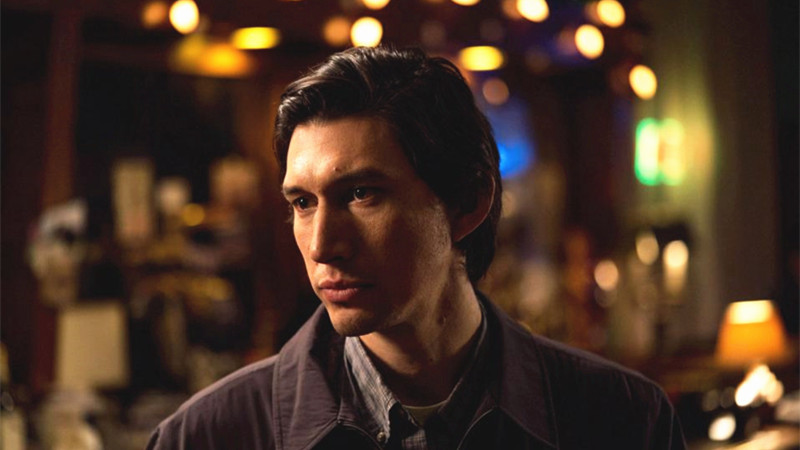
Here’s something most of you have probably figured out already: things don’t always work out like they do in most movies. Sometimes you get the girl, sometimes you don’t. Sometimes you get the girl and lose her within a short space of time. It doesn’t matter how much you love her.
People have a mind of their own, they don’t follow a conventional movie script. We make plans for this grand future only for something to happen that will forever ruin this future from happening. You ask the Gods why this is happening. You’ve been a good person. You don’t deserve any of this. It’s their silence that hurts the most.
Dreams don’t always come true. Movies are full of dreamers who make their dreams come true: Rocky goes the distance, Billy Elliot defies his blue-collar upbringing and becomes a professional ballet dancer, a slumdog can become a millionaire, the short but spirited Rudy can fulfill his dream of playing football for the University of Notre Dame, etc.
Sometimes these films can brighten our day and there’s certainly truth to be found in each of these movies. You should chase your dreams. You shouldn’t give up when faced with an obstacle. But sometimes we need to watch something a little closer to life. A little less fluff, a little more human. A film that doesn’t sugarcoat the existential darkness woven into our existence. Something far more relatable. These people on the screen are just like you and me. We are not alone.
In this list I have compiled 10 films that celebrate or portray everyday life. Some are more cynical than others, but I thought it was important to not just choose depressing films because even those with daily struggles – though don’t we all have them? – life isn’t constantly depressing. Sometimes it’s perfectly mundane. Sometimes there’s incredible joy to be found in the smallest of things.
One film introduces a series of selfish human animals. Another film shows the sadness of a lonely man, the necessity of friendship. There’s redemption in there. There’s the acceptance that things don’t always go as planned. Individuals overcoming bureaucratic entities. There are men on barstools waiting for their lives to start, not realizing that it has already started. There are those who understand that time is running out and begin to make the best of the little time they have.
These are films that take their sweet time. They can be slow. They take their time with the environment and the characters. They give us that moment of awareness of the present moment.
It’s fleeting, but it’s there. We smile and rejoice. We hope we’ll remember it as life goes on.
10. Short Cuts
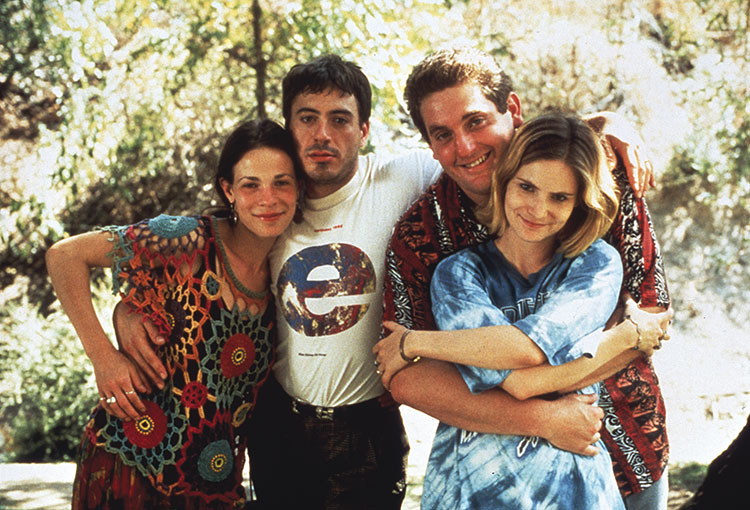
“People are not good to each other,” repeated Bukowski over and over in his haunting poem “The Crunch.” It’s a line that definitely describes the happenings of Robert Altman’s misanthropic masterpiece “Short Cuts,” where we follow the lives of 22 characters in the city of Los Angeles. These characters are selfish, bitter, repressed, angry, emotionally abusive and drink too much – in other words, they are all painfully human.
The disgust with human nature can be felt throughout the film. In typical Altman fashion, we watch these characters from a distance, occasionally zooming in to take a closer look at these sometimes irredeemably flawed people. It’s like we are visiting a zoo of humanity. We see them lie and cheat on their loved ones. We see them at their most pathetic. In the end, we are even witness to a brutal and senseless act of violence. People are just not good to each other.
As per usual in an Altman film, each of these characters are played by incredible and renowned thespians. There’s not a strange face among them and they all do an incredible job. It’s damn near impossible to choose a standout. If I could, I would devote a whole article to how good each of these actors are in their respective roles. You appreciate each character more, every time you see them.
There’s Paul Finnegan (Jack Lemmon), a father hoping to reconnect with his son while his grandson is in intensive care. The repressed rage of Jerry (Chris Penn) becomes increasingly disturbing in your second viewing. You can’t help but feel sorry for Doreen (Lily Tomlin) as she’s stuck and still madly in love with her alcoholic degenerate husband (Tom Waits) who can’t appreciate her. The few touches of human kindness in the film come with the subtle redemption of a resentful baker (Lyle Lovett). There are too many great things to mention.
The stories are loosely based on Raymond Carver’s short stories, a man hailed as “the chronicler of blue-collar despair.” Carver died before the film’s release, but the story’s rights were given with the blessing of his widow Tess Gallagher, who figured that Altman was the perfect fit to adapt his stories on the big screen. Even if the stories are exactly the same – some expanded, some altered, especially with Altman’s knack for improvisational dialog. But both of their voices are there on the screen: Carver’s quiet sense of melancholy as well as Altman’s darkly comic misanthropy.
“Short Cuts” will shock, anger and disgust you. It will also make you laugh at loud. People might not be good to each other, but they wish they could. They want to be loved but they don’t know what it is. What we talk about when we talk about love, is somewhere there, in the stories of Carver and on screen in “Short Cuts.” You just have to read between the lines.
9. Spring, Summer, Fall, Winter… and Spring
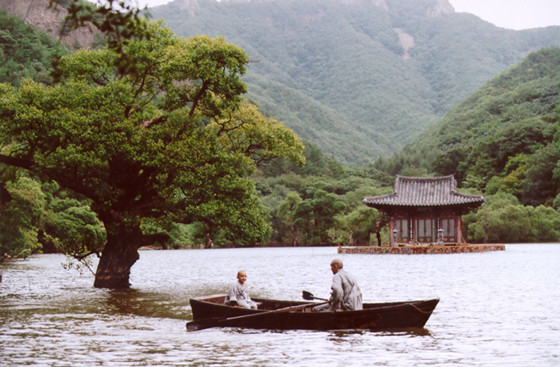
Let’s begin with the setting: a small monastery floating on a river, surrounded by beautiful mountainous forests. Inside this monastery lives a Buddhist monk and his apprentice. The monastery is painted with beautiful Buddhist symbols. A Buddha statue stands in the center of the room which the monk and the apprentice take expert care of. The visuals alone make this film a joy to watch.
The film is set in five parts, each following a different season. Each season is takes place in a different time of the apprentice’s life. The apprentice is a child in the Spring, a teenager in the Summer, an adult in the Fall, a middle-aged man in Winter, and finally an old man in Spring.
In each of the season, a different theme is introduced. In Spring we ponder the cruelty and the sacredness of life. In Summer we take a look at lust and love and burgeoning adolescence. In Fall we see depression, regret and rage. In Winter we see redemption and self-discipline. Finally we return to Spring and we witness rebirth, the cyclical nature of human existence.
The film feels like a Buddhist parable, told to a novice monk as he’s being consulted by his master. There were some scenes of animal cruelty and those scenes were particularly tough for me to watch – a warning for those who are interested.
Being versed in Buddhist symbolism can give you a deeper understanding of this film’s message. Even so, the film, just like Buddhist philosophy, is straightforward enough that it can be appreciated regardless. The viewer needs to understand that this film requires patience, calm and resilience – the same traits a Buddhist monk needs in order to master mindfulness meditation. And just like mindfulness meditation, the rewards are plentiful.
8. I, Daniel Blake
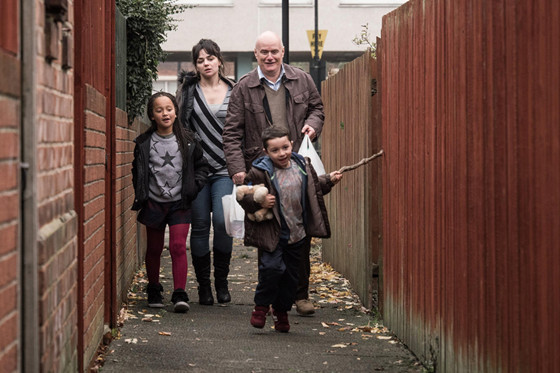
English director Ken Loach has spend his wonderful cinematic career focusing on the trials and tribulations of the ordinary man. Similarly to the work of great social-dramatist David Simon (creator of HBO’s “The Wire” and the recent “The Deuce”), Loach’s films have authenticity to them: the world these characters inhabit feels lived in, the characters speak in their respective dialects.
Just like Simon, he isn’t interested in portraying them as depressing Hollywood archetypes. They can be filled with joy and a morbid sense of human. And also just like Simon, Loach is angry about how the system works against them.
“I, Daniel Blake” is a film filled with anger at the dehumanizing welfare system, in its attempts to beat people down to submission until they give up and wallow aimlessly into the streets. Yet despite its boiling outrage about the mistreatment of workers in the English welfare system, the film refuses to bend to its resentment, mostly thanks to the humanity portrayed through leading man Dave Johns as the eponymous Daniel Blake. Blake is a widower and former carpenter who after a fatal heart attack is advised to stop working.
Unfortunately for Blake, the fact that he can still walk around and move his arms like a normal human being means he’s no longer eligible for his benefits. The repeal process is a long arduous journey. He also has to apply to the job seeker’s program where he’s treated with remorseless hostility. Even through all of this, Blake tries his hardest to keep his spirits up. Along the way he befriends a single mother Katie (Hayley Squires) and her two children.
In a typical Hollywood film, Katie would be the obligatory love interest and a big speech would be made in the end about this unjust system, accompanied with rousing music in the background. Loach respects his audience too much for that and never resorts to melodrama. The film does end on a heartfelt speech, but it feels earned after all we’ve been through.
Most of the film actually focuses on the little things, the poetry of everyday life: Blake, a man out of time, trying to figure out how to apply for jobs through a computer. Blake reminiscing about his late wife to Katie’s two children. Blake fixing things around the house. Blake hanging out with his neighbors. Blake waiting arduously on the phone, while being driven crazy by the MOH.
All of this is represented earnestly and sometimes with good humor.
Yet the darker elements are there too and with good reason. In an interview with The Guardian, Loach talked passionately about the people he met throughout his research, the humiliation these people went through just to get something to eat. We see how little the world desires an old sick man like Blake or how the world objectifies and uses a young woman like Katie.
“I, Daniel Blake” is both an angry call for the rights of workers and a tribute to them. To the downtrodden who are constantly beaten down yet still keep their spirits up. It’s a film that will only become more relevant as modern technology is quickly gulping down every form of menial labor.
7. Trees Lounge
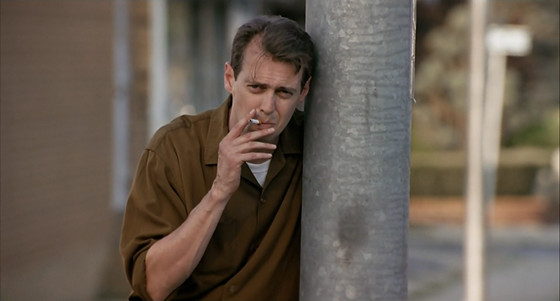
Before Steve Buscemi hassled over giving a waitress an honest tip in “Reservoir Dogs,” he had been an ice cream driver, a mechanic, and a local barfly in Long Island, New York. During this tumultuous period, Buscemi could have gone into a very different direction in his life. If he never got his act together – and if he didn’t get lucky – he could have still been there, drinking throughout the night, wallowing in self-pity, waiting for life to begin. Talking about all the things that could have been if things would have gone just a little bit differently.
Buscemi lays this to bare in his directorial debut, where he himself plays Tommy, a man partly based on his former self. The characters we see on screen are based on people he actually met in this period of his life. The drinking games we see in “Trees Lounge” are real. As with most honest films, we see harsh reality but it’s not drowning in sorrows. There is fun to be had, some laughs and sometimes there is genuine warmth.
There isn’t much of a plot in “Trees Lounge”; it’s simply a character study of Tommy, a former auto-mechanic, who’s in denial of what he’s becoming. His friend and fellow fuck-up Mike (Buscemi regular Mike Boone Junior) is much the same way but unlike Tommy, he’s got a wife and a kid and has something else besides himself to live for. But if there’s one thing alcoholism is very good at, it’s destroying a beautiful thing.
The film has a wonderful cast of character actors who all inhabit the world seamlessly, as if they have lived there all their lives. The possible standout might be a young Chloe Sevigny as Debbie, a teenager who befriends Tommy. It’s another beautiful thing that alcoholism eventually destroys.
Despite being mostly known for his acting work, Buscemi has directed a great series of films, but of none of them have the brutal honesty and heart of “Trees Lounge.”
Buscemi has never lost his blue-collar roots and even put on his firefighter helmet again just to help people in the aftermath of 9/11. He did all of this without seeking any publicity.
6. The Straight Story
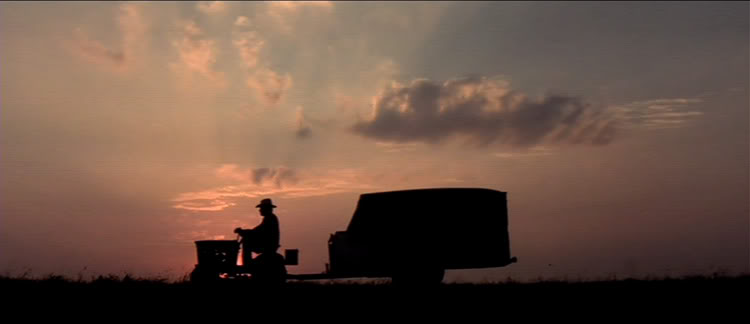
I adore David Lynch as a filmmaker but of all his films, “The Straight Story” (arguably his least Lynchian film) will always be my favorite. This is partly due to sentimental reasons as I’ve watched it with my departed grandmother, who always had a thing for the film’s main star Richard Farnsworth. But more than that, this is the kind of film that you always return to. It doesn’t need to tell its story with mindless spectacle. It’s the simplicity of it, the straightness, that makes the film so intimately effective.
The film is partly based on the real-life story of Alvin Straight, a farmer who traveled 240 miles on a lawnmower to visit his ailing brother – his debilitating sight made him unable to drive a car. The real Straight received a nice fee of ten thousand dollars for the story’s rights, though Alvin did point out that he made the trip only to see his brother, not for any fame or money.
This film would also be Farnworth’s farewell performance as he suffered from terminal prostate cancer during the course of filming. Though he always had a prominent career, just like fellow co-star Harry Dean Stanton (portraying his brother Henry in the final scene), he rarely had any leading parts. Just like the great late Stanton, his last film would be a leading role, with a theme so fitting knowing that death was waiting for both of them – for Stanton it was the wonderful “Lucky.” Farnsworth would tragically kill himself due to the pain of his illness.
There’s not a dishonest moment in the film – and that’s saying a lot since this film was produced by Disney. Every emotional note feels genuine. The score by Angelo Badalamenti perfectly accompanies Straight’s journey as he travels past beautiful country scenery. The film culminates in one of the most touching endings to a film I’ve ever seen. If the ending doesn’t get you, you simply don’t have a heart.